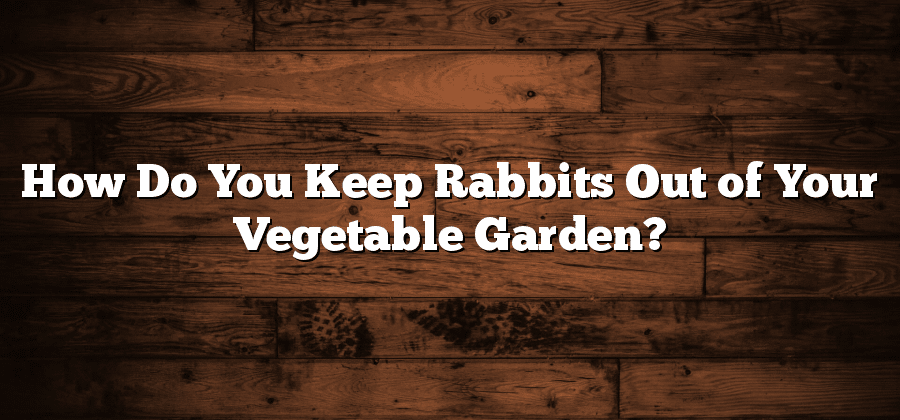Identifying signs of rabbit presence
Rabbits are frequent visitors to gardens, often leaving behind subtle signs that indicate their presence. One clue that rabbits have paid a visit is small, rounded droppings scattered throughout the garden. These tiny pellets are a telltale sign of rabbit activity and can usually be found near favorite feeding areas. Another sign to watch out for is chewed or nibbled vegetation. Rabbits have a preference for tender, young plants and will often leave behind evidence of their snacking habits. Look out for neatly clipped stems or leaves with clean, angled edges as indications of rabbit damage. By becoming familiar with these signs, gardeners can take proactive measures to protect their vegetable patches from these furry intruders.
Choosing rabbit-resistant vegetables
When selecting vegetables for your garden, it is essential to choose varieties that are less likely to attract rabbits. These resilient vegetables can withstand the nibbling and grazing habits of rabbits, ensuring a fruitful harvest for you. Some rabbit-resistant vegetables include leafy greens such as kale, arugula, and Swiss chard. These vegetables have a strong flavor and tough texture which rabbits find unappealing. Additionally, root vegetables like beets, radishes, and carrots are also less likely to be targeted by rabbits due to their subterranean growth.
Another group of vegetables that rabbits tend to avoid are those with strong odors or prickly textures. Herbs like rosemary, lavender, and thyme emit scents that rabbits find off-putting, making them excellent choices for your garden. Onions and garlic, known for their pungent smell, are also believed to deter rabbits. Furthermore, vegetables with fuzzy leaves or rough textures like cucumbers, zucchini, and squashes are less enticing to rabbits as they do not provide the desired tender foliage. By including these rabbit-resistant vegetables in your garden, you can minimize the risk of rabbit damage and enjoy a bountiful array of produce.
Installing physical barriers around the garden
One effective way to protect your garden from rabbit damage is by installing physical barriers. These barriers act as a physical deterrent, preventing rabbits from accessing your precious plants and vegetables. There are various types of barriers available, and the choice depends on the size of your garden and personal preference.
One popular option is using wire mesh fencing. This type of barrier is sturdy and effective at keeping rabbits out. It should be at least three feet high, as rabbits are adept at jumping. Make sure the mesh size is small enough to prevent rabbits from squeezing through. Additionally, burying the bottom of the fence about six inches into the ground will prevent rabbits from burrowing underneath. This barrier not only provides protection from rabbits but also helps keep other small critters at bay.
Utilizing scent deterrents and repellents
One popular approach to deterring rabbits from invading your garden is by utilizing scent deterrents and repellents. These products are designed to emit odors that rabbits find unpleasant, thus discouraging them from entering your garden. One commonly used scent deterrent is predator urine, which can be purchased in concentrated form and mixed with water to create a liquid that can be sprayed around the perimeter of your garden. The strong smell of predator urine can act as a warning for rabbits, making them think that a predator is present and deterring them from venturing into your garden.
Another effective scent repellent is the use of strong-smelling plants and herbs. Rabbits have a keen sense of smell, and they tend to avoid areas with overpowering scents. Planting lavender, mint, or marigolds around your garden can help to repel rabbits, as these plants naturally emit strong fragrances that rabbits find unappealing. Additionally, crushed garlic cloves or onion slices placed strategically around your garden can also act as a repellent due to their pungent smells. By harnessing the power of scents that rabbits dislike, you can create an environment that they are less inclined to explore.
Implementing natural predators and decoys
One way to deter rabbits from your garden is by implementing natural predators. Many animals, such as foxes, coyotes, and hawks, are natural predators of rabbits. By encouraging these animals to frequent your garden area, you can create a natural deterrent for the rabbits. You can achieve this by providing suitable habitats for these predators, such as tall grass and shrubs, as well as food sources like bird feeders or small ponds. Additionally, you can install decoys, such as owl or hawk statues, which may help in creating the illusion of potential danger for rabbits and reduce their presence in your garden. It is important to note that while this method can be effective, it should be used with caution and only in areas where these predators are native and do not pose any harm to other animals or the ecosystem.
In addition to natural predators, another effective deterrent for rabbits in the garden is the use of decoys. Decoys are objects or devices that mimic natural predators or create a sense of danger, causing rabbits to avoid the area. Examples of decoys commonly used to deter rabbits include scarecrows, motion-activated sprinklers, and predator audio recordings. These decoys create an atmosphere of insecurity for the rabbits, making them less likely to approach or dwell in your garden. However, it is important to periodically change the locations and types of decoys used, as rabbits can become accustomed to them over time and may eventually disregard their presence.






